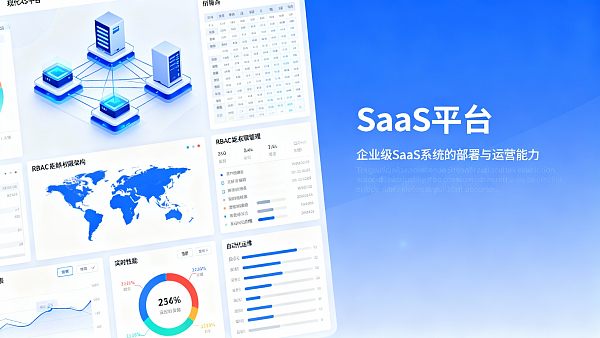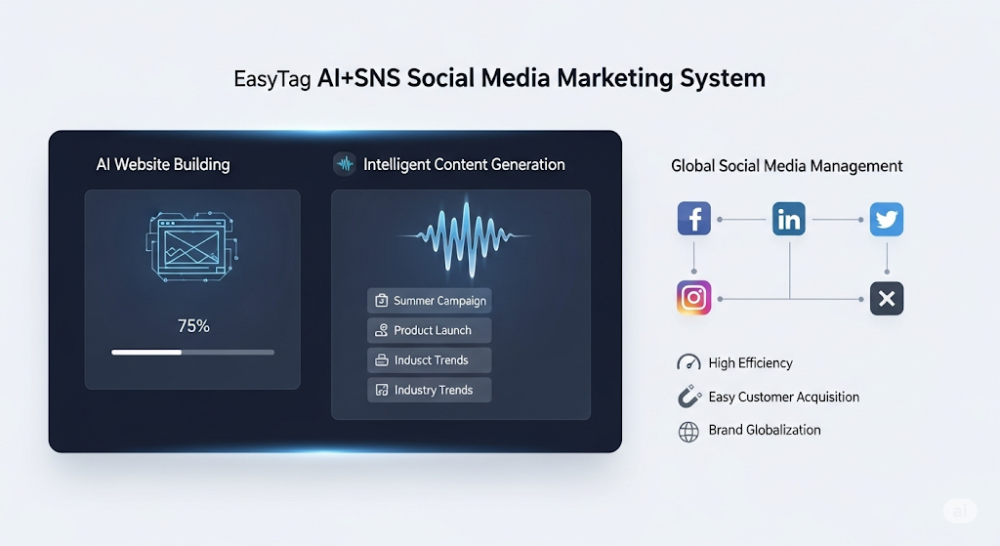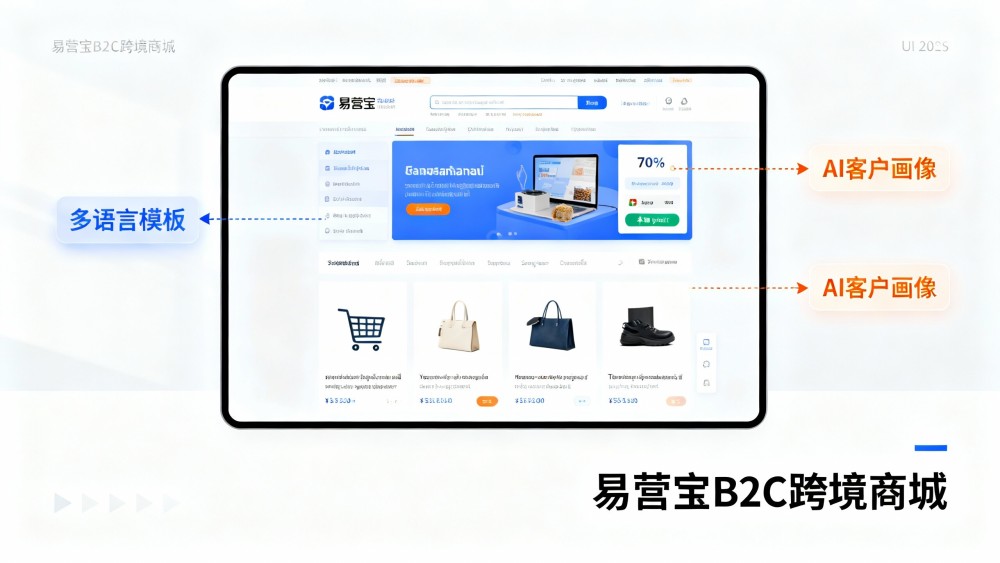- How does EasySales B2B platform help companies reduce customer acquisition costs? 2024 latest data analysis2026-01-12View details
- 2023 China Smart Website Market Research: Analysis of Multilingual Website System Demand Growth2026-01-12View details
- Real User Sharing: YIYINGBAO Usage Experience and Website Effectiveness Evaluation2026-01-12View details
- Intelligent Website Platform Competitive Analysis: Core Differences Between EasyYunbao and Mainstream Domestic Website Systems2026-01-12View details
- 2024 Google Ads vs. Facebook Advertising Cost Comparison: How B2B Businesses Can Choose the More Cost-Effective Option2026-01-09View details
- YouTube Video Marketing Trends 2024: 3 Key Strategies to Boost Conversion Rates2026-01-12View details
- SEO+SEM Integrated Marketing Case Study: How a B2B Company Doubled Its Traffic2026-01-09View details
- Yandex.Promotion vs. Google Ads: Which Should You Choose for Advertising in the Russian Market?2026-01-09View details
EasyStore SaaS Platform Hands-on Review: 5 Key Points on Deployment, Permissions, and Operations
This evaluation focuses on 5 key aspects of deploying, managing permissions, and operating the Yiyingbao SaaS platform, combining multilingual website systems with SaaS website system best practices to provide actionable recommendations.
Deployment Preparation: Architecture Selection and Environment Adaptation

Before deploying an enterprise-level SaaS website system, preparation determines launch efficiency and ongoing maintenance costs. First, evaluate network and regional strategies—the Yiyingbao SaaS platform employs multi-region server clusters globally, particularly crucial for responsive and multilingual website systems where node distribution directly impacts first-screen loading and SEO performance. Three deployment planning essentials: 1) Select suitable cloud services and CDN nodes—prioritize AWS/Aliyun acceleration nodes for cross-border stability; 2) Implement domain and SSL strategies—auto-SSL certificates reduce launch cycles while boosting search engine trust; 3) Test site performance across networks, recording TTFB and full render times. Reference smart website market reports to configure SEO-friendly elements like static/SSR rendering. Deployment validation must include automated regression testing and security baseline checks to ensure compliance. Proper architecture reduces later maintenance complexity—a frequent highlight in Yiyingbao Capterra reviews.
Permission Models & Tenant Governance: Granular Control & Compliance
Permission design is a core challenge for Yiyingbao SaaS users. A clear RBAC-based model with least-privilege principles should define roles like site admins, content editors, SEO specialists, and ad operators. Key practices: 1) Map role matrices to operations—specify who modifies TDK, publishes multilingual pages, or accesses third-party ad accounts; 2) Configure audit workflows—require dual approvals for sensitive actions (production changes, payment/ad client modifications) with change logging; 3) Enable MFA and IP whitelisting. The platform’s cross-team collaboration features received praise in IDC SaaS satisfaction reports, particularly for visual audits and operation tracing. For regulated industries (e.g., education/manufacturing), implement data isolation and export controls. Granular permissions maintain content quality and brand consistency across multilingual sites.
Operations & Monitoring: Alerting-to-Autorepair Closed Loop

Operational capabilities directly impact SaaS website availability and satisfaction. Effective systems cover four modules: metric monitoring, log aggregation, incident recovery, and capacity planning. Yiyingbao’s millisecond response adjustments enable automated operations. Recommendations: 1) Establish KPI dashboards (uptime, latency, error rates, SEO crawl success, ad conversion trends); 2) Set smart alert rules—prioritize traffic/conversion anomalies with tiered escalation; 3) Implement autorepair scripts and blue-green deployments; 4) Conduct DR drills testing data restoration to DNS fallbacks. Incorporate search engine monitoring (crawl errors, index volatility) to preempt SEO issues. By encapsulating complexity, the platform lets users focus on content—contributing to Yiyingbao’s high IDC satisfaction scores.
Multilingual & Content Management: SEO & Localization
For global enterprises, multilingual implementation balances technical execution and semantic localization. Beyond accurate translations, consider URL structures, hreflang tags, language switchers, and local SEO. Essentials: 1) Use dedicated language paths/domains ensuring search engines properly weight each version; 2) Combine AI translation with human review—Yiyingbao’s AI draft engine improves efficiency but key markets require local validation; 3) Set unique TDK per language, utilizing auto-generation for consistency; 4) Localize social/ad creatives using cross-platform automation. Performance optimization via CDN/server node tuning improves search indexing—validated in smart website industry reports. Integrated AI keyword expansion helps teams rapidly adapt to multilingual needs while reducing costs.
Expansion & Verticalization: Modular Capabilities

Yiyingbao’s value extends through modular components and vertical solutions. For electronics components industries, the platform supports parametric product displays. Its API integrations enable complex catalog filtering—e.g., specialized smart classification templates improve browsing conversions. Reference implementation: Electronics Components Solution. Adopt MVP approaches to validate search/SKU logic before scaling caching strategies. Combined with AI ad diagnostics, dynamic creatives can efficiently convert high-volume product traffic. This componentized approach enhances maintainability while earning top marks in Yiyingbao Capterra reviews.
Summary: This guide outlined five Yiyingbao SaaS implementation pillars—deployment, permissions, operations, multilingual support, and vertical adaptation—emphasizing CDN planning, granular governance, automated operations, and data-driven localization. Integrated AI keyword tools, auto-TDK generation, and ad automation reduce costs while improving conversions, as frequently noted in Capterra reviews. For customized solutions, contact us to explore smart website analytics or request product demos.
- SSL Certificate
- Search Engine Optimization
- Campbell (name)
- SEO
- Intelligent website building
- AI Translation
- AI Marketing Engine
- Social Media Automation
- AI Translation Engine
- SaaS Website System
- EasyBusiness SaaS Platform
- SaaS Website System
- Multilingual Website System
- Responsive Website System
- Responsive Web Design
- Smart Website Market Report
- Smart website industry analysis
- IDC SaaS Platform User Satisfaction
- Yiyingbao Trustpilot reviews
- Easy Insurance
- Capterra Easy Treasure
- Yiyingbao Capterra Reviews
Related Articles
![AI Intelligent Advertising Platform + Multi-Language Marketing System: An Executable Solution to Increase Conversion in Overseas Channels AI Intelligent Advertising Platform + Multi-Language Marketing System: An Executable Solution to Increase Conversion in Overseas Channels]() AI Intelligent Advertising Platform + Multi-Language Marketing System: An Executable Solution to Increase Conversion in Overseas Channels
AI Intelligent Advertising Platform + Multi-Language Marketing System: An Executable Solution to Increase Conversion in Overseas Channels![Eyingbao SaaS CMS platform in cross-border site SEO optimization practice and cost estimation Eyingbao SaaS CMS platform in cross-border site SEO optimization practice and cost estimation]() Eyingbao SaaS CMS platform in cross-border site SEO optimization practice and cost estimation
Eyingbao SaaS CMS platform in cross-border site SEO optimization practice and cost estimation![Platform New Feature: One-Click Multilingual Website Builder Now Available—How to Quickly Deploy and Test Platform New Feature: One-Click Multilingual Website Builder Now Available—How to Quickly Deploy and Test]() Platform New Feature: One-Click Multilingual Website Builder Now Available—How to Quickly Deploy and Test
Platform New Feature: One-Click Multilingual Website Builder Now Available—How to Quickly Deploy and Test
Related Products














